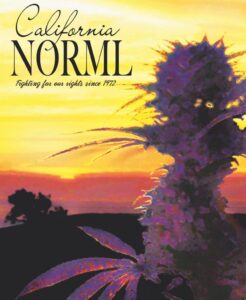 The California Department of Justice has issued updated Guidelines for the Security and Non-Diversion of Cannabis Grown for Medical Use that are in keeping with the advice Cal NORML has been giving patients and collectives in the state.
The California Department of Justice has issued updated Guidelines for the Security and Non-Diversion of Cannabis Grown for Medical Use that are in keeping with the advice Cal NORML has been giving patients and collectives in the state.
The DOJ guidelines give an overview of the state marijuana laws that have passed, starting with Prop. 215 in 1996, which legalized medical cannabis, and covering Prop. 64 in 2016, which legalized recreational adult marijuana. Noting that the federal Cole memorandum was rescinded by AG Jeff Sessions, they state, “medicinal marijuana operators acting in compliance with state laws are protected from federal enforcement under the Joyce/Blumenauer Amendment until its expiration on September 30, 2019.”
The guidelines mention that the CBD preparation Epidiolex has been categorized in the new federal Schedule V, “Approved cannabidiol drugs,” for FDA-approved drugs with cannabidiol derived from cannabis and containing no more than 0.1 percent THC. No mention is made of the US Farm Bill that descheduled hemp and hemp-derived products.
Included are guidelines for police officers when presented with a medical marijuana recommendation from a physician, or a state ID card. Although the ID cards are voluntary, they are a better protection against arrest for possession of cannabis, as the guidelines confirm. “Cannabis and cannabis products lawfully possessed are no longer subject to seizure,” the guidelines state, citing H&SC § 11362.1, subd. (c). “Reasonable suspicion is required for detention, while probable cause is required for search, seizure, and arrest; and the motor vehicle exception to a probable cause search still applies.”
“If the officer reasonably believes that the medicinal claim is valid based upon the totality of the circumstances (including the quantity of cannabis, packaging for sale, the presence of weapons, illicit drugs, or large amounts of cash), and the person is within the state or local possession guidelines or has an amount consistent with the their current medical needs, the person should be released and the cannabis should not be seized. Alternatively, if the officer has probable cause to doubt the validity of a person’s medicinal cannabis claim based upon the facts and circumstances, the person may be arrested and the cannabis may be seized. It will then be up to the person to establish his or her medicinal cannabis defense in court.”
“If a person whose cannabis is seized by law enforcement successfully establishes a medicinal cannabis defense in court, or the case is not prosecuted, he or she may file a motion for return of the cannabis. If a court grants the motion and orders the return of cannabis seized incident to an arrest, the individual or entity subject to the order must return the property.”
Regarding medical cannabis collectives and cooperatives, the guidelines note that “under the MAUCRSA, medicinal cannabis cooperatives and collectives are required to obtain state licenses to operate as of January 10, 2019. The exceptions to this requirement are: (a) individual patients; and (b) caregiver gardens serving no more than five patients. (Bus. & Prof. Code, § 26033, subd. (b).) It list requirements that “apply to qualified patients and primary caregivers who come together to collectively or cooperatively cultivate physician-recommended cannabis,” including limits on the number of plants or pounds per patient, and the need to obtain a seller’s permit and obey local ordinances.
Criminal defendants, probationers and parolees may request court approval to use medicinal cannabis while they are released on bail, probation or parole, the guidelines state. However use of medical cannabis at correctional facilities or in the workplace need not be accommodated, and an employer may terminate an employee who tests positive for cannabis use. Read about Cal NORML’s campaign for employment rights for cannabis users and support our employment rights campaign (donations will be doubled through Labor Day).
All of California’s current cannabis laws and regulations will be covered at a Legal Workshop co-sponsored by Cal NORML in Los Angeles on September 25, 2019.



